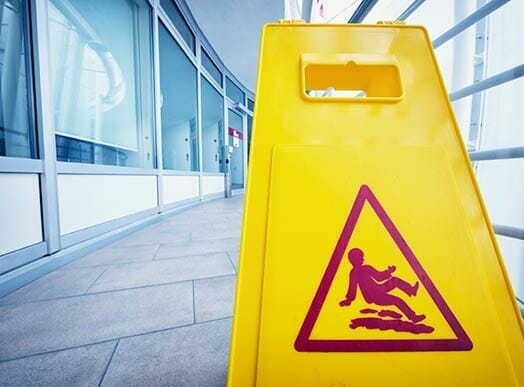
- June 21, 2014
- Attorney David Mann
- Slip, Trip and Fall Accident
Slip and fall accidents are responsible for sending over one million people to emergency rooms every year, according the National Floor Safety Institute (NFSI) – resulting in steep medical costs, lost income and physical pain and suffering. When the accident happened on someone else’s property and liability is an issue, how can you determine whether an owner was truly negligent if they claim you were being careless?
Playing the He Said / She Said Game
Whenever a premises liability accident occurs, you’re likely to get into a he said / she game over how the accident occurred – especially when insurance companies are involved. In fact, many insurance companies will attempt to invoke what’s called the “open and obvious doctrine” in slip and fall cases.
What they’re basically alleging is that the victim of a slip and fall accident was being careless by not paying attention to where they were walking. In some cases that might be true; in others it’s not accurate. So, how do you determine liability, and more importantly, how do you get the compensation you need to pay for your slip and fall injuries?
Georgia law allows slip and fall victims to bring a premises liability claim against a negligent property owner, which can include individuals and businesses, when they, 1) fail to maintain or repair dangerous conditions on their property, or 2) fail to adequately warn visitors of the danger.
Rest assured that negligent property owners can be held liable for an injured person’s losses, including medical treatment, lost income, pain and suffering and more.
Proving liability requires demonstrating that the property owner knew – or should have known – about the danger and had an opportunity to fix or warn others about the problem, but did not. So a business owner who notices a wet floor, but ignores it, would likely be liable if someone slipped and fell. However, if the owner noticed it and put up a warning sign, they would likely not be liable.
It’s the situations that fall somewhere in between those scenarios that make proving liability a bit more troublesome – such as an owner who noticed the wet floor, went to get a mop, got detained and didn’t get back in time before somebody fell. That’s where an experienced premises liability lawyer can help.
Common Causes of Slip & Fall Injuries
While there are many ways in which a slip and fall accident can occur, some of the most common include:
- Wet, slippery floors for which no warning is given
- Broken handrails and steps
- Cracked sidewalks
- Insufficient lighting in hallways, common areas or parking lots
- Potholes in parking lots
- Uneven curbs
At first glance, many of these types of accidents wouldn’t seem likely to cause serious injuries. However, slip and falls often do cause broken bones, traumatic brain injuries (TBIs) and spinal cord injuries – all of which can result in significant medical bills, rehabilitation, lost income, physical pain and suffering, emotional distress and more.
Remember, insurance companies will likely claim that you simply weren’t watching where you were going. Having a slip and fall accident lawyer on your side to examine the accident site, analyze maintenance records, interview witnesses and determine the extent and future costs of your injury can help even the playing field. Don’t let an insurance company hide behind the “open and obvious doctrine” if a premises owner was liable for your injuries. The law is on your side.



 Before leading his own firm, Mann served for several years as in-house defense counsel for a large insurance company, which gives him unique insight into how insurance companies work. He uses this critical knowledge as an advantage for his clients. He is a tough negotiator and litigator, and he is exceptionally strategic in building cases on behalf of personal injury victims.
[
Before leading his own firm, Mann served for several years as in-house defense counsel for a large insurance company, which gives him unique insight into how insurance companies work. He uses this critical knowledge as an advantage for his clients. He is a tough negotiator and litigator, and he is exceptionally strategic in building cases on behalf of personal injury victims.
[ 